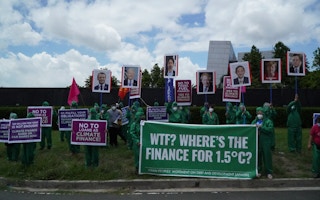The three-day meeting between the leaders of the world’s most industralised economies has been a failure, according to Filipino campaigners, who said that the group had been unable to commit to climate action, including climate finance.
The recently-concluded G7 Leaders Summit held in Carbis Bay, United Kingdom from 11 June to 13 June issued a joint statement on Sunday, saying that they are committed to “net zero no later than 2050” and “halving their collective emissions by 2030”. The G7, which include leaders of Japan, Germany, the United States, United Kingdom, Canada, Italy and France, also reaffirmed their pledge made in 2009 to mobilise US$100 billion in annual funding to developing countries for climate adaptation.
But Lidy Nacpil, coordinator of the Asian Peoples Movement on Debt and Development (APMDD), a regional alliance of 50 member organisations and movements, said: “G7 governments have been repeating promises to mobilise climate finance of a minimum of US$100 billion a year. They have failed to deliver on this pledge. And US$100 billion a year is actually a pittance compared to the scale of need and their climate finance obligations.”
The G7 nations have pledged about US$12 billion so far to the Green Climate Fund (GCF), the main finance mechanism under the United Nations Framework Convention on Climate Change (UNFCCC), according to APMDD. However, only 44 per cent of the committed funds have been delivered as of April 2021.
Among the seven nations, the US, UK and Japan have made the highest pledges at US$3 billion each. So far Japan has delivered the most among them, fulfilling 63 per cent of its commitment, followed by the UK at 62 per cent. The US has only delivered a third of its promised climate funding.
Germany and France vowed climate funding of US$2.7 billion and US$2.6 billion respectively, but both countries have only given about half of the amount, based on 2021 data of GCF.
Apart from the G7, 38 other developed countries, three regions and one city have made pledges to the GCF, amounting to US$20 billion but actual disbursements remain at an average of US$10 billion every three years, APMDD said in a statement.
Finance for adaptation has also been overlooked, with only US$1 billion pledges mobilised for the adaptation fund, with much of climate finance pledges coming in the form of loans, which add to the debt burden of countries most affected by the climate crisis, added APMDD.
Aaron Pedrosa, secretary general of Sanlakas, a coalition of marginalised sectors in the Philippines, said climate finance should be “new and additional, non-debt creating, and accessible to those who need it the most.”
“The US$100 billion a year target is not even enough to cover all the climate needs of the most vulnerable nations. In 2020 alone, global climate disasters that mainly hit the global south, will cost more than US$210 billion,” he said.
“Meager climate finance” but soaring fossil fuel spending
Climate activists likewise slammed how the G7 nations have spent billions on fossil fuels but are dragging their feet on fulfilling their climate pledges.
The US has spent up to US$72 billion on fossil fuels from January 2020 to March 2021, with at least US$68.67 billion allocated for oil and gas and US$122 million on coal, according to 2021 data from think tank Energy Policy Tracker.
For the same period, the UK invested US$42 billion in mostly oil and gas investments, but like the US, promised a mere US$3 billion for climate adaptation and mitigation support for developing nations.
Canada has invested US$31 billion in dirty energy, about a hundred times more than its climate commitment to poorer countries. Japan was the only G7 nation which spent less on fossil fuels at US$1.6 billion compared to its climate pledge.
“If we are to compare the meager climate finance mobilised so far to the billions of dollars the G7 spent on fossil fuel financing and other false solutions, it clearly shows very low ambition. At the height of the climate emergency, this is no longer acceptable to us,” said Oyette Zacate, secretary general of women-led group Oriang Philippines, which is a member of APMDD.
No exceptions
The joint statement of US President Joe Biden and South Korean President Moon Jae-in released by the White House at the end of their bilateral summit in Washington on Saturday stated that both nations will “work together to end all forms of new public financing for unabated overseas coal-fired power plants.”
APMDD objects to the phrase “unabated coal” which likely refers to coal-fired power generation without the use of carbon capture and storage technology (CCS). CCS technology is designed to strip out carbon dioxide from the exhaust gases of industrial processes, which studies have claimed to be a “safe and effective” way to help limit the effects of climate change.
This exception “paves the way for continued overseas financing of specific coal projects,” said APMDD’s Nacpil. To have a likely chance of keeping the 1.5C goal alive, all forms of public financial support for all coal projects must stop, including for so-called coal that uses CCS, and supercritical and ultra-supercritical technologies, Nacpil added.
“While we welcome commitments by developed countries to stop public finance for overseas coal, we are disappointed and alarmed by the exceptions,” Nacpil said.
Susan Tagle, coordinator of the Asian Energy Network, said coal power projects that use CCS technology have become exceptions in the revised energy policies or coal exit policies of many public and private financiers of coal.
“We have to understand that there is no such thing as clean coal technology. Champions of clean coal say it is environmentally friendlier but research found that it fails to deliver on its environmental promises and actually emits more pollutants,” she said. “We have to remember that we have exhausted the world’s carbon budget. We can no longer afford to build new coal-fired power plants within this decade.”

















